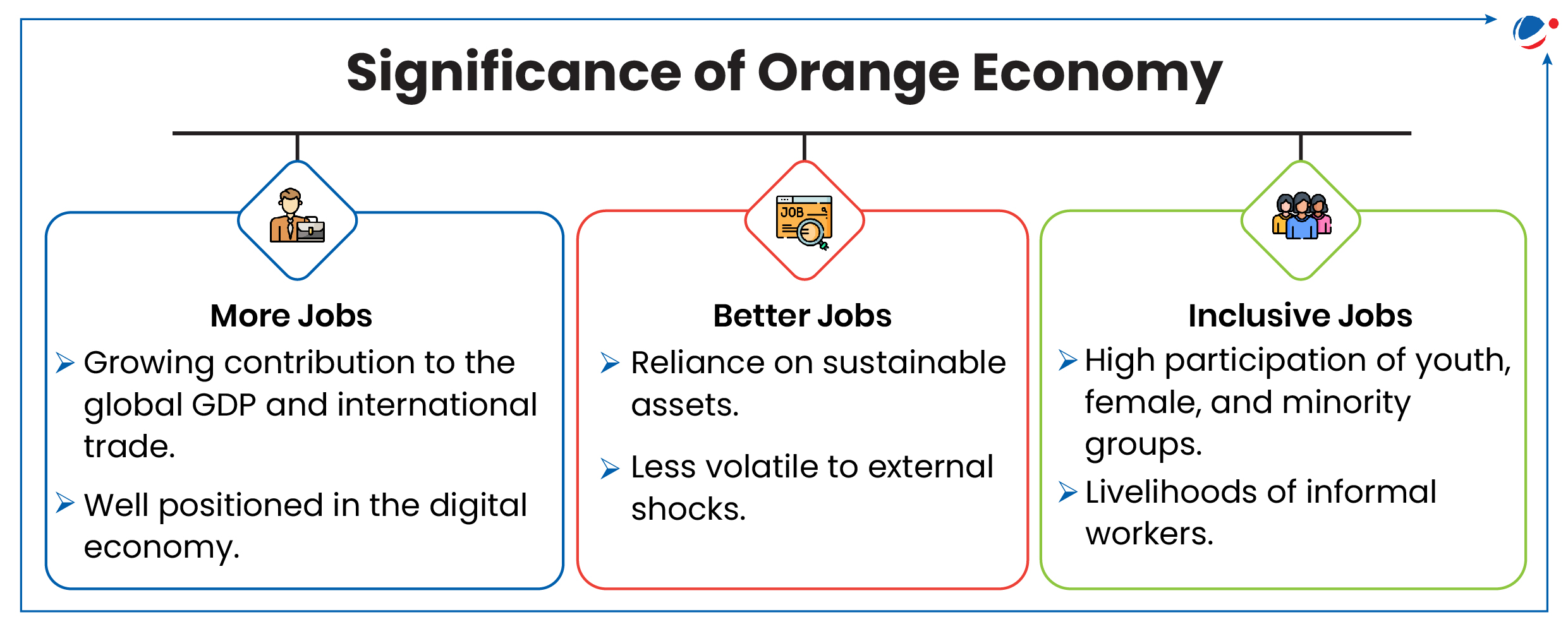Why in the News?
A UNESCO "Behind the Screens" survey highlighted the growing influence of Digital Content Creators (DCCs) while raising a question on their credibility.
About Digital Content Creators (DCCs)
- They are individuals who produce and share digital content such as text, videos, images, podcasts, and interactive media across platforms like YouTube, Instagram, and TikTok.
- DCCs play a crucial role in the broader Creator Economy (or Orange Economy), which includes cultural and creative industries producing goods, services, and content rooted in cultural or artistic origins.
- Globally, the creative economy generates over $2 trillion annually and supports nearly 50 million jobs worldwide, according to the 'Creative Economy Outlook 2024' report of UN Trade & Development.
- In India, the creative industry is valued at $30 billion, employing 8% of India's workforce.

Risks and Implications Posed by Digital Content Creators
- Social and Ethical Risks:
- Misinformation and Fake News: The ease of creating digital content accelerates misinformation, manipulating opinions, inciting harm, and eroding public trust.
- E.g., 62% DCCs do not carry out rigorous and systematic fact-checking of information prior to sharing it (behind the screen report).
- Privacy Violations: Content creators often share personal information, either intentionally for engagement or unintentionally due to lack of awareness, leading to privacy breaches.
- E.g., the Cambridge Analytica scandal (2018) revealed Facebook harvested millions of users' data, including that of content creators, to target political ads and influence elections.
- Algorithmic Amplification: Social media algorithms often prioritize engagement over accuracy, creating an echo chamber that amplifies disinformation and reinforces misleading narratives.
- When creators prioritize popularity (41.6% use likes and views as a credibility metric), they're incentivized to create sensational content rather than verified information.
- Lack of training and literacy: DCCs are not fully aware of their rights and responsibilities as well as legal frameworks governing their content (patent, copyright laws etc.).
- Other issues: Promotion of unrealistic standards; Lack of Transparency in Sponsored Content; Online harassment etc.
- Misinformation and Fake News: The ease of creating digital content accelerates misinformation, manipulating opinions, inciting harm, and eroding public trust.
- Regulatory Challenges
- Lack of a Unified Regulatory Framework: Although the Information Technology Act, 2000, and Consumer Protection Act, 2019, govern digital content, there is no unified framework specificallydesigned to address the unique challenges of the creator economy.
- Regulatory Overlaps and Jurisdictional Conflicts: Various agencies, including MeitY, the Department of Consumer Affairs, and TRAI, regulate digital content.
- Economic Risk
- Losses in Conventional Media: The shift in news consumption from traditional media (print, TV) to digital platforms has led to financial losses for conventional media.
- Online platforms gain from traditional media content without investing in journalistic processes like training, editorial checks, or news verification, giving them an unequal bargaining edge.
- Losses in Conventional Media: The shift in news consumption from traditional media (print, TV) to digital platforms has led to financial losses for conventional media.
Ways to Mitigate Risks Posed by Digital Content Creators
- Promote media literacy programs and fact-checking initiatives to combat misinformation.
- E.g., Google News Initiative (GNI): Google has partnered with fact-checking organizations worldwide to provide training and tools for journalists and content creators to verify information.
- Implement data protection laws and privacy education for content creators.
- E.g., General Data Protection Regulation (GDPR): In the European Union, GDPR enforces strict data protection rules, requiring platforms and creators to handle user data responsibly.
- E.g., India's Digital Personal Data Protection Act, 2023: It aim to protect user privacy and hold platforms accountable for data breaches.
- Establish fair revenue-sharing models and support for traditional media.
- E.g., Australia's News Media Bargaining Code: It requires tech giants like Google and Facebook to pay news publishers for using their content.
- Ensure a legislative balance between Digital Content Creator's right to freedom of speech and expression and excising state's right to regulate content through sanctions.
- E.g., redrafting Broadcasting Services (Regulation) Bill, 2024 (it was withdrawn due to lack of support).
- Enforce advertising regulations and promote clear disclosure practices.
- E.g., In India, the Advertising Standards Council of India (ASCI) has called out influencers for not using clear disclaimers like #ad or #sponsored in promotional posts.
- Encourage ethical content creation and transparency to rebuild public trust.
- E.g., UNESCO's Media and Information Literacy (MIL) Program: UNESCO has launched initiatives to educate content creators and the public on critical thinking and media literacy.
- E.g., India's Information Technology (Intermediary Guidelines and Digital Media Ethics Code) Rules, 2021 (See box)
The Information Technology (Intermediary Guidelines and Digital Media Ethics Code) Rules, 2021.
|




